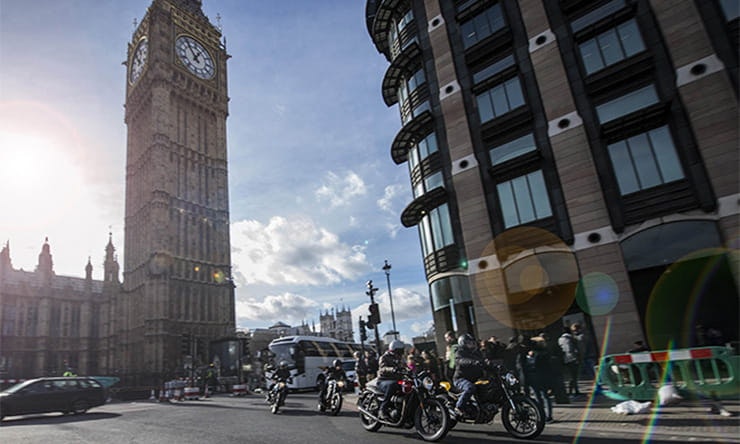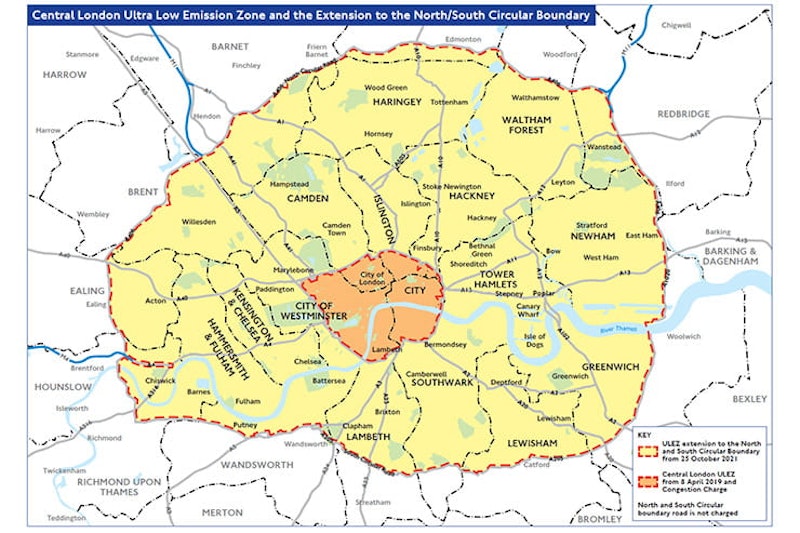ULEZ? Help BikeSocial help affected riders
By Steve Rose
BikeSocial Publisher
05.04.2019
I can’t remember the name but some bright spark once said ‘It takes a moment to get it wrong and a lifetime to put it right.’
The speaker was a celebrity sportsman who’d been arrested for a punch-up in a bar, but the principle is much broader. Motorcycle manufacturers are a good example. When Aprilia went mainstream in the late 1990s and launched their brilliant RSV1000, they spent a lot more time and money making the bike than thinking about their dealer network, spares supply and coherent customer service. It didn’t take long for their reputation to build as being lacking in all three areas and it’s a reputation that still dogs them now, 21 years later. That’s despite the fact that the problems have been largely sorted for about 19 of those 21 years and, as part of the Piaggio group Aprilia has access to some pretty big brains and sophisticated systems.
The flip-side of that was Triumph, who, shortly after launching their T595 superbike in 1997 discovered that some of the frames were cracking around the headstock area. It was a massive and embarrassing problem for the company, but the way they handled it and dealt with customers was exemplary and actually enhanced their reputation.
It isn’t often that the motorcycle industry as a whole gets the chance to get behind its customers and do some good, but such an opportunity has just been well and truly missed. Transport for London (TfL) is about to launch its Ultra Low Emission Zone (ULEZ), where vehicles emitting more than 0.15g/km of Nitrogen Oxides (NOx) will have to pay a £12.50 levy each day to travel in central London.
Now, the obvious argument against including bikes in this is that the NOx measurement should be in g/minute, not g/km because a motorcycle will take much less time to travel a kilometre than a car in a real-world situation and so the actual emissions per real world km will be a lot less. On an open road or rolling road you can compare bike and car emissions, but in a congested urban scenario the car will be sat in traffic before spewing out pollutants as it gets a ton of metal, plastic and flesh into motion while a bike glides through traffic on a trailing throttle barely emitting anything.
Download a pdf copy of the map here.
For cars and trucks the data is clear because exhaust emissions requirements have been part of their type approval and MoT tests for years. But bikes aren’t tested annually and, although the manufacturers have type approval data for emissions, they only started quoting it in separately for NOx in the late-2000s. Look on your V5 registration document and you might see the emissions levels if your bike is relatively new. But not if it is older.
The simple cut-off point is bikes made after 2007 when all new two-wheelers sold had to be compliant with Euro 3 regulations, which included a requirement for NOx levels to be lower than 0.15g/km. And TfL’s default position that feeds their online checking service is based on Euro 3 compliance. But some bikes built before Euro 3 also comply and so are exempt from the charge. Quite a lot of bikes as it turns out.
The dream scenario here and the missed opportunity from the motorcycle industry has been to get behind riders, gather up all the data that they have on which pre-Euro 3 bikes are compliant and supply it to TfL so they can update their checker. They’ve had plenty of time to do it (ULEZ was a Boris Johnson initiative when he was Mayor, which pre-dates Brexit) and, while it would have involved some work it would have been a one-off job for the good of motorcyclists.
Instead the response from manufacturers and the industry has been mixed and even the good ones have moaned about it. If you have an older bike, to check compliance you have to contact the maker and ask for a certificate-of-conformity. TfL’s system doesn’t currently recognise one certificate for a particular bike and then apply it across the whole system. So while the rider who got a certificate for his 2003-model Honda Pan European gets exemption from the charge, his mate, riding the same make and model, who didn’t get a certificate will get fined if he rides in central London. That’s despite TfL getting information supplied indirectly by Honda that demonstrates that the 2003 Pan European (that’s generic Pan Euros…Honda hasn’t tested rider 1’s specific machine) is compliant.
TFL says the system is set up that way because sometimes manufacturers tweak settings without really changing anything else and so while a 2005 Yamasaki wizz-bang-million might be compliant, the seemingly identical 2004 model isn’t.
It seems crazy that at some point in the last few years the Motorcycle Industry Association (MCIA) hasn’t called in all the data and supplied it to TfL in order that they only charge the right machines. Instead, what’s happening is that many manufacturers are spending huge amounts of time pissing off owners of their machines by not being as helpful as they ought to be because ULEZ is a right-royal pain in the bum. Some are providing CoCs for free, others are charging, others just don’t want to know.
I had a conversation with someone in the industry about this who wasn’t too bothered because these riders of older machines ‘aren’t really our customers, are unlikely to buy a new bike and tend to buy aftermarket parts and spares and service their bikes themselves’. Which seems a bit short-sighted to me. In five years’ time (or much sooner if their bike is non-compliant and need a replacement) those riders might well be buying a new bike and needing factory servicing and spares. And even so, they might love their Bandit 1200, Fazer1000 or VFR800 and consider themselves to be a ‘insert favourite brand here’ afficionado.
Right now, if they live in London and ride an older bike, motorcyclists are being left to sort it out for themselves, even though the industry has an awful lot of data on an awful lot of bikes that can help.
BikeSocial would like to help make this process easier. If you’ve had a CoC which exempts your bike, send us a pic of it (the certificate…and the bike if you want to) to enquiries@bikesocial.co.uk and we’ll start to compile our own database. At the same time we’ll ask the manufacturers to supply us with lists of pre-Euro 3 bikes that they already know to be compliant so we can start to build a database that we can take to TfL and hopefully they will review their thoughts on block-exemptions.
And while we are happy to do it, I can’t help but feel that the UK bike industry has missed an opportunity here to look after their riders and do the hard work for them. Being the go-between for riders and TFL would have been brilliant, but a scrappage scheme in London for older bikes and some smart finance deals on manufacturer-approved used bikes could have made a huge difference. They could also have saved themselves a load of work too.
Share on social media:

